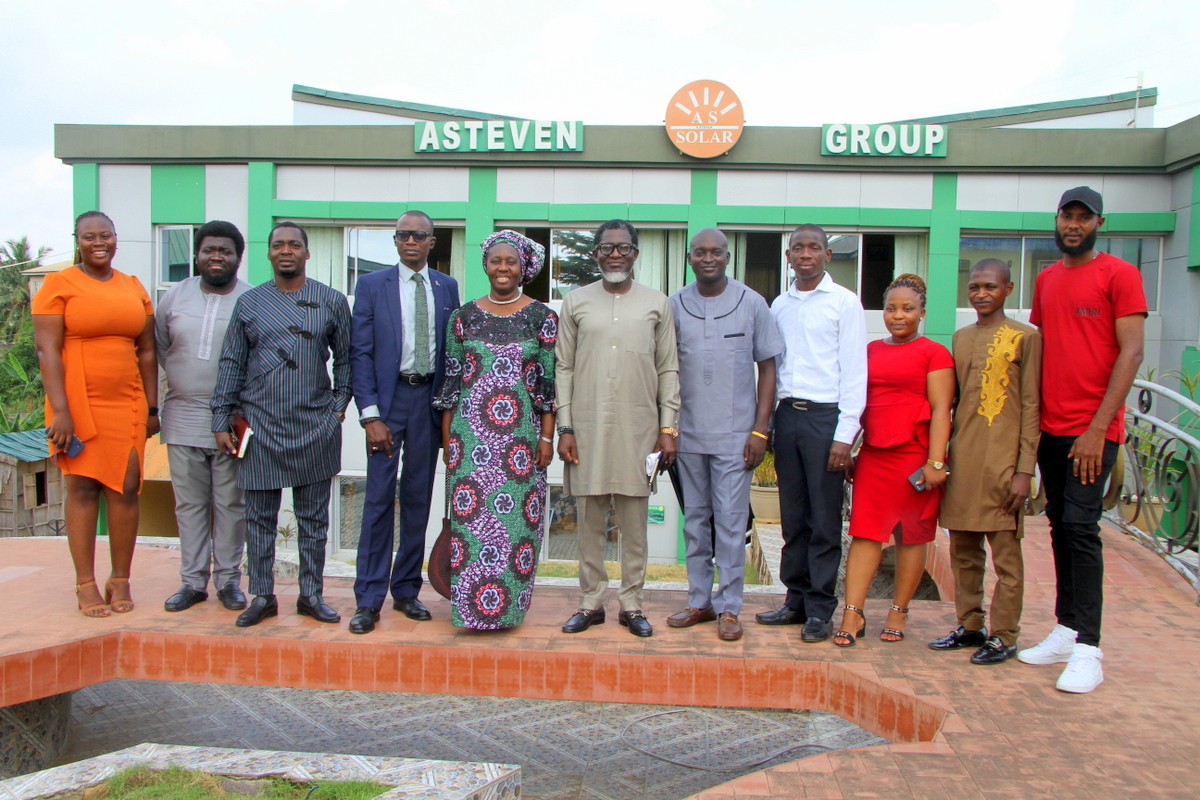- To partner with Renewable Energy Associations in Nigeria
- First Innovation Enterprise Institute in Solar Energy Technology approved by NBTE
- To offer National Innovation Diploma degrees to Students
The Asteven Energy Institute, a wholly owned indigenous subsidiary of the Asteven Energy Group, has received a vote of confidence from representatives of the Council for Renewable Energy Nigeria (CREN) and Renewable Energy Association of Nigeria (REAN), who have jointly endorsed the Asteven Energy Institute to provide the much needed certification, skills development and practical training expertise for manpower development in Nigeria’s Renewable Energy Sector.
This was after the associations paid a courtesy visit and undertook a facility tour of the Asteven Energy Institute on Tuesday, June 14th, 2022 at one of the Institute’s campuses, located along the Lagos-Ibadan expressway, Ogun State.
The Asteven Energy Institute is the only approved Innovation Enterprise (IE) centre accredited by the National Board for Technical Education (NBTE) to award National Innovation Diplomas in Solar Energy Technology with inclusion in the Joint Matriculations Board (JAMB). With four campuses located in Ogun State, Delta, Rivers and Abuja, the Institute is well placed to provide global quality training to aspiring technicians in the Solar Industry.
The Nigerian government has embarked on several renewable energy, mostly solar based, initiatives for inclusion in the energy mix of the country and as well reduce the lack of energy access. This is more telling when juxtaposed against the fact that the single most negative factor in ensuring business growth in the country is the lack of sustainable and constant electricity. With over 200million people, expected to increase by 25percent by 2025 and an estimated energy deficit of 45percent, that’s close to 95 million people not having energy access, and the remaining 55percent under an inconstant load sharing plan, the need for an alternative energy source becomes a national security question.
Unfortunately, there is a dearth of skilled manpower in the sector, paving the way for proliferation of unaccredited training centers and influx of foreign technical manpower resource. This is what Asteven Energy Institute has in its sights to do away with.
According to the Registrar of the Institute, Engr Ebami Arogboritse, ‘It’s all about the quality of training. We undertook a curriculum development process that spanned almost two years, sponsored consultants to different countries to understudy their training regimen, studied the electricity sector in Nigeria and the manpower needs before the curriculum was developed fully’. At every step of the way, we interfaced with the National Board for Technical Education, made sure all requirements were provided, facilities and equipment put in place; and I am bold to say, no other training centre for Renewable Energy has the full complement of equipment we have for training our students.
Such equipment include a Simulator to test electrical performance parameters and integrity of Solar Panels; a Spectroradiometer integrating sphere system to check LED Bulbs quality, Lab-to-field solar design and installation systems and also a well packaged financing and entrepreneurship model to ensure immediate integration into the clean energy industry upon graduation.
This dedication is what we have come to see and partner with, says Dr Segun Adaju, President of the Renewable Energy Association of Nigeria (REAN). It is high time we sanitized the sector through providing the requisite capacity and manpower expertise so we can scale and provide better services to the industry.
Secretary General of the Council for Renewable Energy Nigeria (CREN), Mr Sam Ifeanyi Nwosu disclosed that CREN has over the years advocated for better local content participation in the renewable energy sector and ensuring an adequate mill of trained technical resource is a major step towards achieving this. ‘We need to have an accredited and respectable certification process and examination for technicians in the solar industry in Nigeria’. This is the only way we can compete and ensure that the benefits of the growing focus on solar energy is locally entrenched’.








Your article helped me a lot, is there any more related content? Thanks!
Thanks for sharing. I read many of your blog posts, cool, your blog is very good.